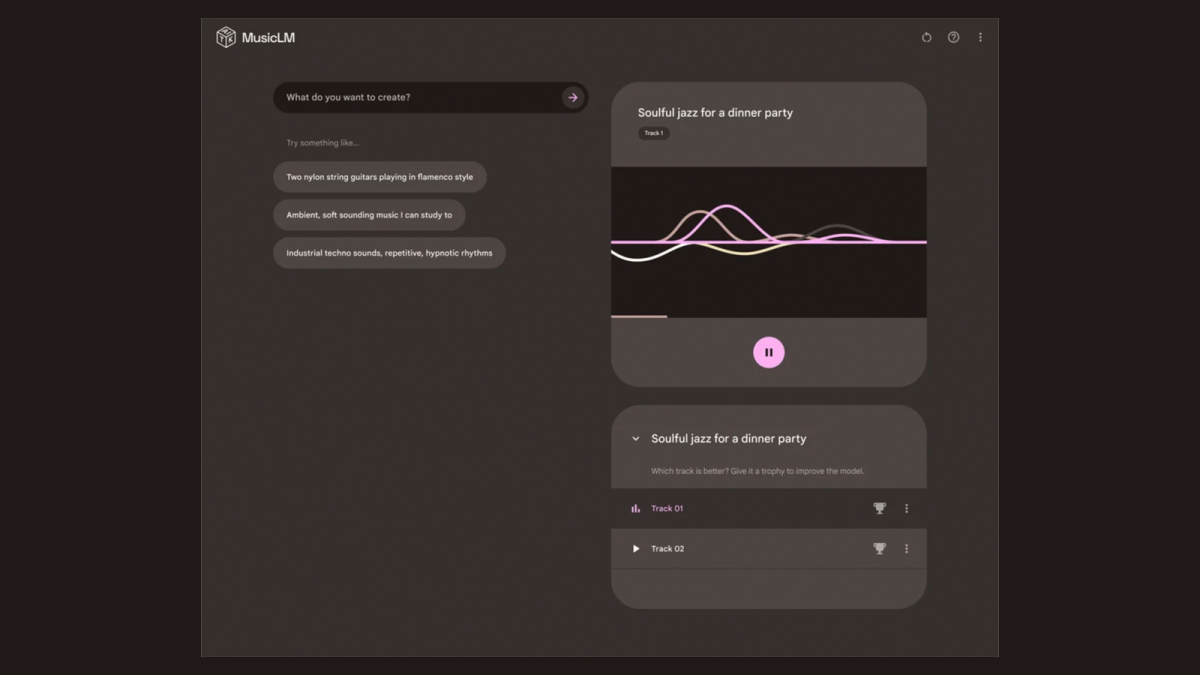Earlier this year, Google demonstrated a text-to-music AI sound generator called MusicLM. Along with a research paper titled MusicLM: Generating Music From Text, the team behind MusicLM shared a variety of audio examples of what the AI could do.
This week, Google have opened up MusicLM to the public. Anyone can now sign up to test the software through Google’s AI Test Kitchen, though there is a waitlist. We haven’t yet been able to access it, but we’ll show you what the AI can do as soon as we’re in. We’ve embedded some tweets below that show off what MusicLM sounds like, along with a demo from YouTuber Mike Russell.
MusicLM can generate sounds, musical ideas and even entire tracks on demand, while responding to a variety of detailed stipulations. The AI can understand prompts relating to genre, mood and type of instrument, it can adjust the experience level of the ‘musician’ it was emulating, and it can even imitate melodies recorded by the user. That means you can whistle a tune, and the AI can play it back as a saxophone solo or a heavy metal guitar riff.
MusicLM will generate two clips of audio in response to any given prompt. The user is invited to select which of these they prefer in order to help train the AI. Interestingly, MusicLM will not imitate the sound or style of existing songs or musicians, something that OpenAI’s Jukebox can do. This is a cautious move on behalf of Google, as debate surrounding the growing conflict between generative AI and copyright law continues to develop (opens in new tab).
Google have shared a video (embedded above) that shows an artist workshop in their Arts & Culture Lab. Speaking about the technology, Google Program Manager Freya Murray says that “artists have always been known to use the tools available to them and push tools in unexpected and surprising ways. I see MusicLM as an evolution of that.”
Google Artist In Residence Simon Doury suggests that MusicLM could be a tool used by musicians to generate accompaniment. “If you don’t play the piano or guitar, you start prompting and you get an accompaniment,” he says. “For example, if you’re a drummer and you want something to play with, you can just type and you have something.”
Many musicians and producers are concerned about generative AI’s potential to threaten their livelihoods in the future. Google haven’t directly addressed this in their announcement, but in a statement published on their blog, they claim to be working with musicians to understand how AI can “empower the creative process”, and affirm their commitment to “responsible innovation”. MusicLM was built in accordance with Google’s AI Principles, a set of guidelines for developing technology responsibly.
Research scientist Neil Zeghidour claims that for Google, the most important thing is that MusicLM is “used by artists in a way that is meaningful to them and can allow them to explore new ways of creating sounds”.
Sign up to try MusicLM through Google’s AI Test Kitchen. (opens in new tab)
The beat makers are in trouble #MusicLM $goog pic.twitter.com/gLTUeVgN7QMay 10, 2023
Google’s MusicLM isn’t perfect, but neither was Stable Diffusion. This is impressive. pic.twitter.com/R7oGNHbC0EMay 10, 2023
This new MusicLM music generator is sick. #GoogleIO $goog pic.twitter.com/4ExYgMCcxYMay 10, 2023

